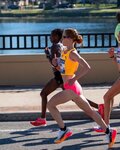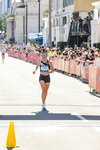Annie Frisbie of River Falls and Breanna Sieracki of Spring Valley are two local marathon runners who competed in the Olympic trials in Orlando in February, with Frisbie finishing 10 th in the …
This item is available in full to subscribers.
To continue reading, you will need to either log in, using the login form, below, or purchase a new subscription.
If you are a current print subscriber, you can set up a free website account and connect your subscription to it by clicking here.
Otherwise, click here to view your options for subscribing.
Please log in to continue |


Annie Frisbie of River Falls and Breanna Sieracki of Spring Valley are two local marathon runners who competed in the Olympic trials in Orlando in February, with Frisbie finishing 10th in the nation.
Each of them received an invitation for the trials by competing in a sanctioned marathon and finishing under the women’s threshold of 2:37:00 within the qualifying window of Jan. 1, 2022 to Dec. 5, 2023. Frisbee hit this goal time in New York in 2022, while Sieracki punched her ticket at Grandma’s Marathon in Duluth in 2023.
With marathons being an individual sport, they are actually both on the same team of professional runners based out of the Twin Cities called the Minnesota Distance Elite. Frisbie says they have a couple members from elsewhere but most are from the Midwest.
The Elite is comprised of athletes specializing in events ranging from 800 meters all the way up to the 26.2-mile marathons like the one they competed at in Orlando.
With Minnesota winters being less than optimal, the qualifying team members went down to Florida a month or two prior to get acclimated to the heat and humidity. This was made possible in part by sponsorships from companies like Twin Cities Orthopedic and Grandma’s Marathon who invest in the team both through financial means and with services such as physical therapy, strength training, MRIs, and anything they need to stay healthy.
The track in Orlando was sprawling for the trials. It consisted of one 2.2-mile loop at the beginning and then three 8-mile loops that wound straight through downtown Orlando and commanded an unusual crowd size.
“This was my first Olympic trials, and I can only compare it to the two other marathons I've done which were a very quiet, relaxed start, but I was overwhelmed. I almost felt frantic for the first two miles because it felt like a tunnel of people yelling and screaming. It really depends on what people are comparing it to, but I thought it had great crowd support,” Sieracki said.
Sieracki says competing in the Olympic trials, especially in what was just her third ever marathon, isn’t she something intended to do, and the only reason it came up was becoming pregnant with her daughter.
“I never thought I would run a marathon, but when my husband and I decided to start a family, I just kind of had this crazy idea of how fun would it be to train for a marathon during pregnancy and then run a marathon within a year postpartum,” Sieracki said. “So, I did my first marathon at nine months postpartum. I wasn't really focused on place or competing, I just really wanted to gain experience. For my second marathon, which was Grandma’s in 2023, I did have more set goals. I wanted to hit the Olympic trials qualifying time, and I wanted to continue to learn how to compete in a marathon.”
Unfortunately, Sieracki picked up an injury while racing in Houston just three weeks before the Olympic trials.
“I just felt like my posterior chain along my right side locked up. I thought it was going to be strong enough and healthy enough to run the marathon, but a marathon exposes your weaknesses. Unfortunately, mine showed really early about mile three,” Sieracki said. “I felt my hamstring tighten up, so I kind of just tried to stay headstrong for a while. I'm like, nope, it'll warm up, it’s still early, but it kind of went the other way.”
She says it feels a little anti climatic to put all that hard work into a race, to know your fitness is somewhere where it's never been before and how exciting that is, but to not really be able to put that down on paper.
Nevertheless, although she knew she’d finish near the bottom, she refused to quit.
“I think stopping would have been more defeating mentally,” Sieracki said. “I really wanted to control what I could control and that was not quitting on myself and finishing this opportunity to race the trials because it could be a once in a lifetime opportunity. You just never know, and I didn't want to take that for granted. I never thought about stopping to be honest.”
Sieracki says there’s a lot more that goes into running a marathon beyond just the physical, there’s a whole gamut of internal struggles that athletes go through during such an intense and prolonged expenditure of physical energy.
“How do you push through those moments? When is it appropriate to get really uncomfortable in a marathon, and when is it too soon? I'm still learning that,” Sieracki said. “Even in the trials, you go in and you're trying to get the most out of yourself and take risks but also run smart and compete and just be able to leave it all out there. You face a lot of demons when you're running a marathon, and you have to know how to navigate those challenges and see it as a challenge rather than a threatened shut down.”
The other members of the Elite had better luck with their health, but Frisbie thinks she left some opportunity on the table finishing 10th.
“There are some marathons where it's fast from the gun. Then there's more tactical marathons where there's a lot of mind games being played, and you're trying to feel out your competitors to see if their weakness is starting to show and they're probably going to fade, or just trying to keep your own composure together and to not show any weakness,” Frisbie said. “It's pretty different depending on the course, the race and the people who are in it, but the trials was definitely more of a tactical event.”
Frisbie’s strategy was to stay with the front pack but to hang back and let her pacing carry her to the finish line.
“The front pack was pretty large for a long time. There was like 30 women at least through the first 8-mile loop, and then by the second 8-mile loop, I think it was closer to like 15. Then in the last 8-mile loop, that's where a lot of carnage started to happen,” Frisbie said. “I didn't know I was in 10th until probably five miles to go. A woman actually dropped out in front of me, and I was hearing spectators saying, ‘oh you're in 10th you're in 10th.’ So, I knew where I was at, but it was definitely late in the race, and unfortunately, there was just too big of a gap between ninth and 10th.”
Although Frisbee and Sieracki came up short for the Elite, another member of their team did not. Dakotah Lindwurm of St. Francis, Minn. finished with a time of 2:25:37, and she will be going to Paris this summer to compete against the best marathon athletes from across the globe.
That third place time is especially frustrating for Frisbie because her objective was below that.
“I did not reach my goal. I was in shape to, and on a perfect day, I’d be anywhere from 2:22 to 2:25. I just fell apart a little bit too soon,” Frisbie said. “The marathon is such a mental event. It's not over until mile 26, and then you still have 400 meters to go kind of thing. But I think I started to fall apart around mile 17 or 18, and in my mind, it was over. And it really wasn't over.”
Frisbie says that there was a move made around mile 17, and the move was fairly extreme.
“In my mind, I thought I was slowing down, but I just didn't realize that it was the front people speeding up. Had I just stayed at my pace, I think I would have caught quite a few people,” Frisbie said. “Instead, I slowed down, the legs just started to feel like heavy weights, and I wasn't quite able to catch the people I was hoping to catch. It's definitely a weird experience when you're out there by yourself.”
With the trials behind them, a new season begins, and Frisbie says the team is already ramping back up their training program after a week off.
“It's a very gradual ramp up, we're definitely not just jumping right back into where we were fitness wise, right before the marathon, when we're kind of in that peak fitness. It's really important to kind of come down and rebuild that base,” Frisbie said. “Typically, it's anywhere from like eight to 12 weeks out from the race that you start the marathon specific training. Between now and then it'll be more focused on some shorter distances, anywhere from 5k up to 25k being the longest.”
Frisbie says their coach does a great job of tailoring each runner’s training to their own specific needs. A lot of their runs throughout the week are just easy recovery miles pacing anywhere from 6:30 to 8:30 minute miles, depending on the athlete, and that's just keeping their heart rate low and focusing on recovering. They have two harder workouts a week and then one long run as well.
“We're not running a marathon every day by any means. Weekly mileage wise, we can range anywhere from 80 to 130 a week, depending on the athlete,” Frisbie said. “A lot of times we're doing 20 to 23-mile runs. But those extra three or four miles, it's just nice to know that we can do that in training, so we will usually have one or two long runs before a marathon that are between 25 and 28 miles.”
Sieracki says that each member of the Elite has a different lifestyle that they fit being a professional athlete into.
“It really is a very individualized sport. I work part time as an online run coach, but then I am a full-time mom. All the other time I can, I'm dedicating to try to be the best I can be on the marathon and on other races,” Sieracki said. “We have some people on our team who have full-time jobs, we have some people who are still in school and then we have some that have multiple part-time jobs. It’s kind of whatever makes sense for where they're at in their life.”
So, barring unforeseen circumstances, the wheels are already set in motion for Frisbie and Sieracki to be right back where they were four years from now, vying for an opportunity to compete on a world stage.
“We'll definitely be racing,” Sieracki said. “Hopefully a couple more marathons before 2028, but also sprinkling in some shorter stuff here and there in between the marathons, which can really help you grow as an overall athlete too.”